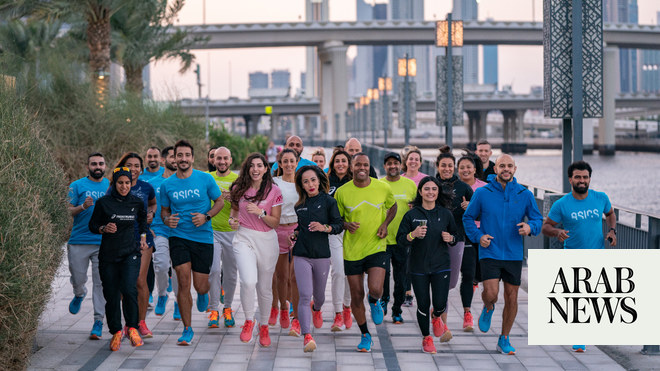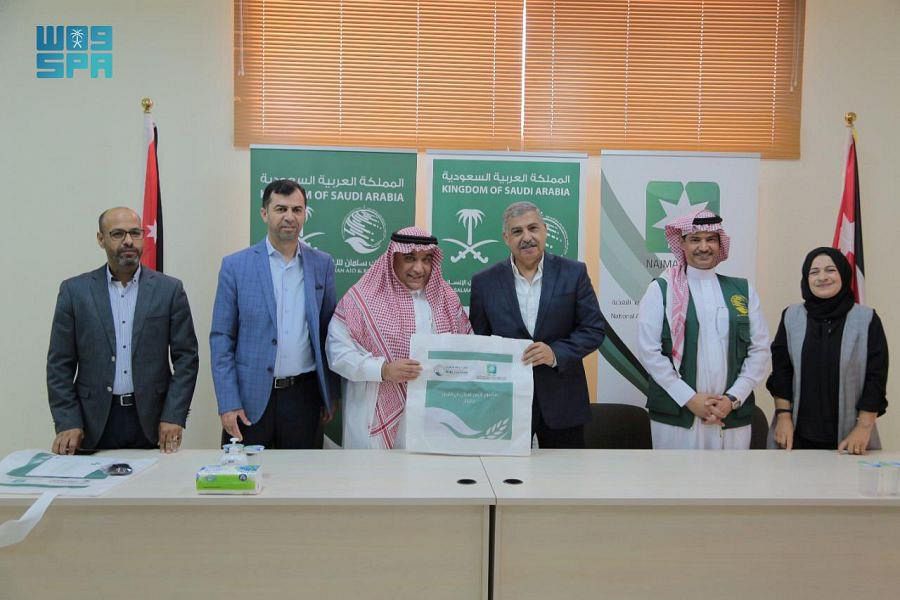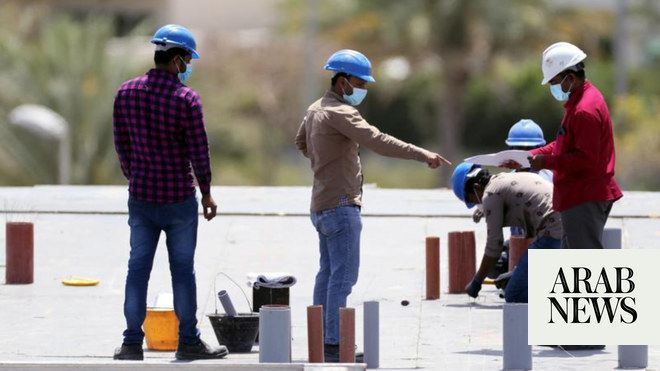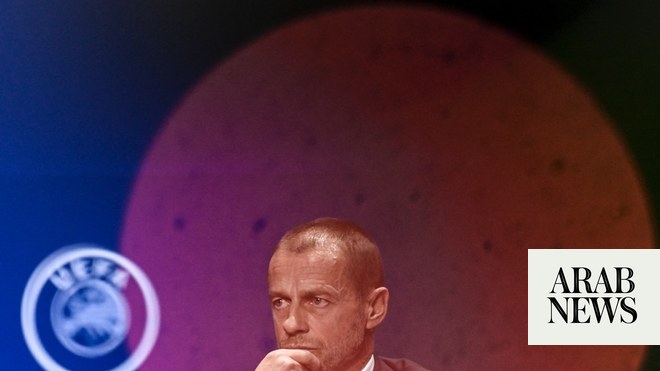
June 7 marks Global Running Day, but for many athletes in the GCC, it is part of daily life
“You do not stop running because you get old, you get old because you stop running.”
For the latest updates, follow us on Twitter @ArabNewsSport
This is the paraphrasing of George Bernard Shaw’s famous saying on “playing” and getting old, by Christopher McDougall, from his seminal 2009 book “Born to Run,” about the legendary running tribe, the Tarahumara. It is especially poignant on June 7, which is Global Running Day.
Across the GCC, many runners of all abilities and ages will mark the day in their own way, no doubt with the appropriate hashtags and photos.
But for many others, running is quite literally a way of life, and over the last two decades in particular, running groups and clubs have sprung up across communities from the UAE to Kuwait, Qatar and Saudi Arabia.
Nicolas le Roux, who is an established member of Dubai Creek Striders and an ASICS FrontRunner, explains why running clubs have been so successful across the UAE.
“Here in (the) UAE, there is a huge expat community, and being far away from family and friends, makes it even harder to adjust and make new connections,” said the South African. “Being part of a running community allows one to be social around a very common theme which is movement. At Dubai Creek Striders we create a save environment without any barriers (no cost to join or participate) and allow beginners to advance runners to train all over Dubai at various sessions on offer.”
The DCS was established in 1995, and since 2002 has held an annual half marathon which today attracts over 2,000 runners.
“Our annual Dubai Creek Striders Half Marathon is the most iconic half marathon and 10 kilometers on the running calendar,” said Le Roux. “This beautiful route meanders over, under and alongside the spectacular Dubai Creek, embracing the sights and sounds of this incredible city.
“It’s a run where the community come together, a race that is organized for runners by runners themselves. It’s a nonprofit event, meaning that all money raised, goes back into making this race an extraordinary experience time in and time out.”
Le Roux calls running clubs an “extension of our communities.”
“It’s where people get to know each other, dealing with disappointments, celebrating successes and triumphs of what we can overcome. Our running community has no commercial gain, creating a safe, friendly environment to get fit.
“People feel inspired by getting involved and offer their time to volunteer. It is most rewarding being able to do something good that you are passionate about and you see the enjoyment of achievement in others.”
The ASICS FrontRunner Community has been heavily involved in supporting runners in the region, with 60 of its members active participants, leaders, pacers and race organizers across the Gulf.
“It’s a brand that really believes in getting involved in everything that supports our community including sponsoring our race, reducing cost and providing us with (a) world-class technical running shirt for every participant.”
Part of the community is Fuad Naser, the founder of the Dubai-based 5:30 RUN Club.
“Our running club offers a multifaceted and invaluable experience that goes well beyond the act of running,” said the Jordanian-Palestinian. “The motivational environment, social connections, mentorship opportunities, emotional support, and personal development programs all contribute to the growth and transformation of individuals, where they can achieve remarkable results in their physical, mental and emotional well-being.”
Naser has seen firsthand how regular running has impacted people’s lives, bringing positive physical and mental change to these individuals. “Running clubs have brought about profound transformations in the lives of runners, revolutionizing their physical fitness, promoting healthier lifestyles, and enhancing their mental well-being,” he said.
“By fostering a supportive community, facilitating structured training programs, and providing opportunities for personal growth, these clubs have become instrumental in achieving holistic health. The impact reaches far beyond the distance logged, as individuals experience improved physical fitness, adopt healthier habits, and find solace, support, and personal growth within the running community.”
The 5:30 RUN Club welcomes runners — and aspiring runners — of every background, said Naser.
“Our running club is located in Dubai, Abu Dhabi and Sharjah,” he said. “We believe in fostering an inclusive and supportive environment where individuals of all abilities can come together to enjoy running and improve their fitness.
“Whether you’re a seasoned runner or just starting out, you’ll find a welcoming community that will encourage and support you in achieving your running goals. Our club offers various training programs and sessions designed to cater to different skill levels.”
Eden Uy, who hails from the Philippines, is the co-founder of the running club 3f Striders, a nonprofit which was established in Dubai in 2014 and now has a branch in Abu Dhabi.
“We offer free coaching on swimming, cycling and running to the community and build connections with people, and with that connection we are able to share our faith and inspire them to get going and move,” she said. “Nothing feels better (than) when you see the members growing and reaching their goals in the sports, from couch to marathon or Ironman. Thanks to those who volunteer and dedicate their time to share their knowledge and skills with the members.”
Uy echoes the words of Le Roux and Naser by saying the running clubs contribute more than just an opportunity to exercise.
“3f Striders participate in community service through coordination with the Philippine consulate, and their social events or community service,” the marine administrative officer said. “Members are also open in sharing ideas and skills in the group as well as business opportunities.”
Omar Al-Filakway, another ASICS FrontRunner, is a coach based in Kuwait, and has built up a strong online fanbase — 304,000 Instagram followers — in recent years. It has allowed him to spread the gospel of running to a wide audience.
“As I lived in the era where there was no social media and currently living (in) the social media era, I can say that in the past there was a difficulty in spreading awareness and education towards running,” he said. “However, today social media has made spreading knowledge and awareness very easy, whether it was through live Instagram, posts, reels, stories, etc.”
“Furthermore, these media messages not only spread in Kuwait and this region, but all over the world, which is a huge benefit because I can reach out to people who are not just close to me.”
As in Dubai and across the GCC, running has grown steadily in his homeland, said Al-Filakway.
“In the recent years, running has become a very popular activity in Kuwait and there has been an increase in the number of runners within the community and it has become a big responsibility for us as experts and professionals in the field of running to spread awareness and knowledge about this sport in a safe and correct manner. Seeing the running community grow in Kuwait makes me very happy.”
Al-Filakway sees that, for some local athletes, running offers wider aspirations.
“To become a professional runner is the right for every runner or fitness fan and to become competitive,” he said. “There are lifestyle runners who have genetic dispositions that allow them to become professional provided that they receive the correct training.”
For Al-Filakway, running, as much as it attracts expatriate communities across the Gulf, also serves to break down barriers for the local populations.
“Being in a Gulf, Arabic, Muslim country, we do face some difficulties in the sport of running, especially when it comes to women and the way (they) dress and specifically for running in public areas,” he said.
“However, in more recent years and after the spread of the sport of running and knowledge and education towards it, and after the increase in the number of women who have taken on the sport … and events and races, there has been more confidence for women to practice this sport in public areas without being afraid. As for men, we never faced any difficulties.”
Perhaps it is fitting to end with another quote from McDougall: “The reason we race isn’t so much to beat each other … but to be with each other.”












